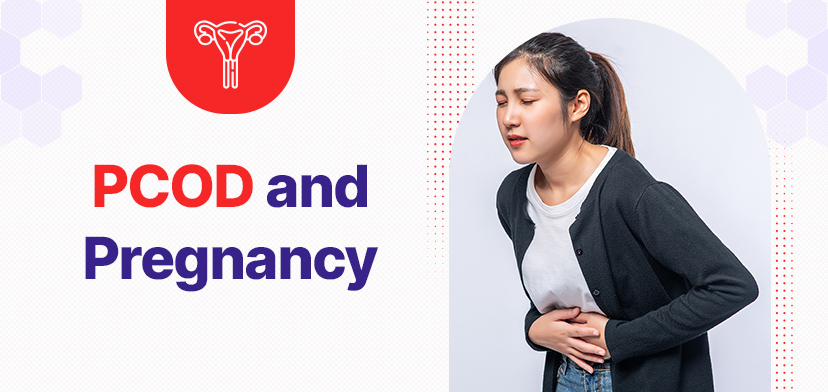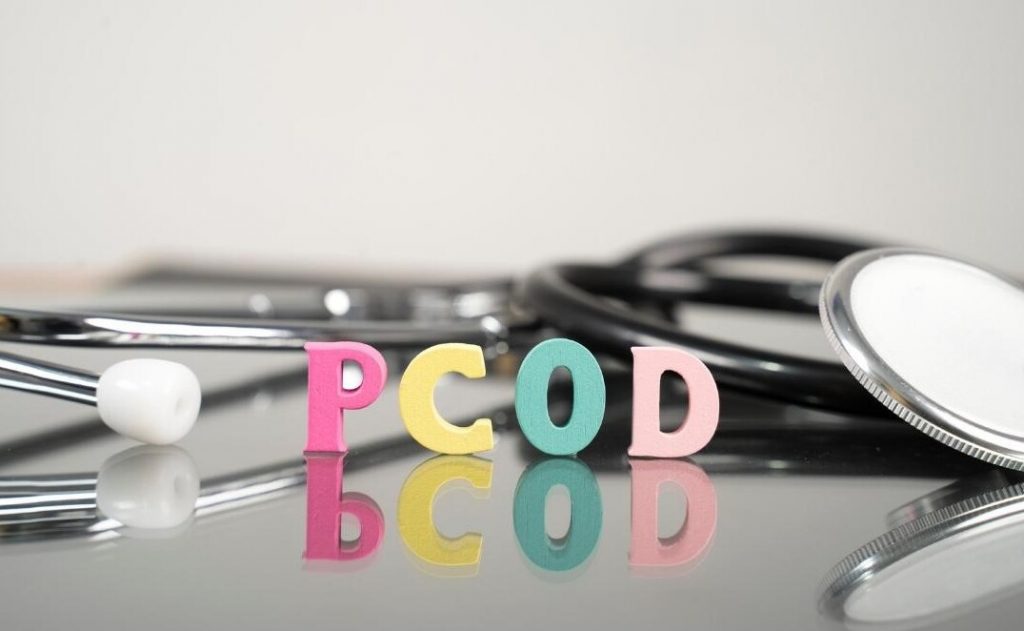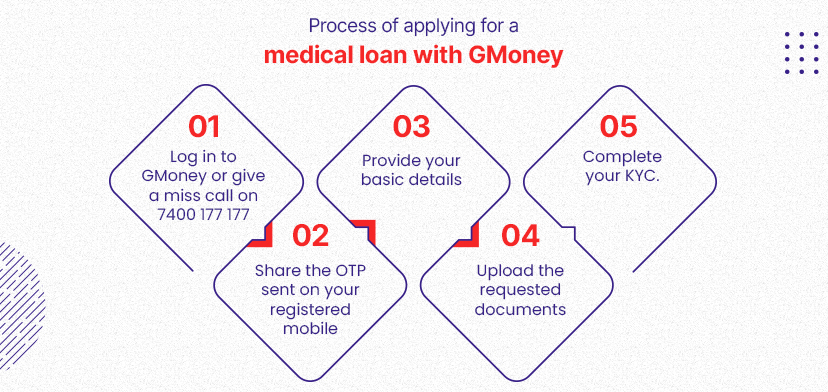Home » PCOD and Pregnancy: Risks and Precautions to Consider

“I didn’t get my period for about 6 months, and then it came, and I bled for more than 15 days”
“I was worried about not getting my period for so long, my family even questioned if I was pregnant”
“I was lean and thin my entire life, and now suddenly, I turned obese.”
“I bleed a lot, and it is very painful”
Do these sound familiar to you? You are not alone in who is experiencing these symptoms. These are the common symptoms of PCOD, and there are many women who are experiencing PCOD. According to a study by the National Institute of Health, around 20 percent of women suffer from PCOD.
PCOD full form is Polycystic Ovarian Disorder. It is a condition in which women release immature or partially mature eggs in large numbers, which over time, form cysts in the ovaries. This condition is also marked by increased levels of androgens (male hormones) as well as irregular menstrual cycles.
If you are suffering from PCOD, and are worried about your pregnancy, then this PCOD and Pregnancy blog is for you. This article will help you understand what PCOD is, its symptoms, causes, precautions and treatment. So, read this blog till the end to know everything about PCOD and Pregnancy.

PCOD (Polycystic Ovarian Disorder) is a medical condition that affects the ovaries. In this condition, the ovaries release a large number of immature eggs which are not fully developed for fertilisation. These immature eggs turn into cysts over time, leading to the enlargement of the ovaries. Due to the condition, the ovaries also secrete large amounts of androgens which cause infertility, hair loss, irregular menstrual cycles, and weight gain (obesity).
According to Dr Ranu Chabra, an expert gynaecologist and obstetrician in Jalandhar, PCOS and PCOD are two different conditions. Both conditions arise due to hormonal imbalances in women. However, PCOD is mainly associated with the ovaries, while in PCOS, the ovaries and the endocrine system are also affected.
It is estimated that every 2 out of 10 women are suffering from PCOD. However, the symptoms experienced by them may be different.
Let’s check out the causes of the PCOD problem before discussing the PCOD problem symptoms.
The exact cause of PCOD is unknown. However, there are some significant factors that can lead to PCOD problems. These factors include:
Excessive Insulin Production
Insulin is a pancreatic hormone responsible for the maintenance of blood sugar levels. When secreted in excess, insulin interferes with the female hormone system. The high secretion of insulin causes increased androgen levels in the body. These increased androgens disrupt the normal ovulation process and cause difficulty in ovulation.
Excessive Androgen Production
Androgens are the male hormones responsible for the development of male characteristics in both men and women. However, excessive production of androgens in females can lead to PCOD. High levels of androgens interfere with the normal functioning of the ovaries. This results in the development of cysts in the ovaries. Excessive androgen production in women also leads to hirsutism (excessive hair growth) and acne.
Obesity
Obesity is one of the prime causes of PCOD. Obesity often leads to hormonal imbalances in women. This may further cause PCOD.
Heredity
PCOD may also be hereditary. Women with PCOD have a higher chance of passing it on to offspring, and it shows a genetic correlation.

PCOD can cause an array of symptoms. These symptoms also vary due to the severity of PCOD. The most common symptoms of PCOD include:
Additionally, Dr Sachin Dalal, an expert gynaecologist and IVF specialist with 17+ years of experience, says, “PCOD can also lead to infertility. The patient will develop symptoms like irregular periods, severe body and pelvic pain, fatigue, and weight gain. The complete PCOD problem treatment is not possible, and it can be only controlled and managed with proper medication and lifestyle changes.”

The PCOD condition significantly impacts the reproductive health of the patient. Women with PCOD are more likely to attract certain problems or complications during pregnancy and childbirth. Moreover, women with PCOD also face challenges in conceiving a child. PCOD leads to several complications during pregnancy. The PCOD problem in pregnancy is very common and needs to addressed on time.
Increased risk of miscarriage
Women with PCOD are more likely to experience a miscarriage during their pregnancy. The hormonal imbalances often interfere with the development of the foetus in the early stage leading to miscarriage.
Higher chance of gestational diabetes
Gestational diabetes is a condition that occurs during pregnancy. In this condition, the pregnant woman’s body becomes resistant to insulin, leading to high blood sugar levels. Women with PCOD have a higher risk of developing gestational diabetes due to their pre-existing insulin resistance. Proper management of blood sugar levels during pregnancy is crucial for the well-being of both the mother and the developing baby.
Higher risk of pre-eclampsia
Pre-eclampsia is a sudden increase in blood pressure after the 20th week of pregnancy and can potentially harm the mother’s liver, kidneys, and brain. This condition may also lead to organ damage and thus require immediate action. Physicians often suggest preterm delivery of the baby to safeguard both mother and the child.
Increased Chances of Premature Birth
An infant is considered preterm or premature when delivered before the 37th week of pregnancy. Women with PCOD are more likely to deliver a premature baby.
C-Section Surgery
As women with PCOD experience symptoms like increased blood pressure, they are at a higher risk of undergoing C-sections. Though a C-section is a safe option for delivery, it requires more time and appropriate care to recover from the surgery.
According to Dr Swapnil Patel, an expert Gynecologist and obstetrician in Modasa, Gujrat, PCOD can not be completely cured but can be effectively managed and controlled by taking precautions. He suggests the patients follow a healthy lifestyle and avoid high-fat foods. High-fat foods can worsen insulin resistance complications and can quickly elevate blood sugar levels and weight gain.
Dr Swapnil Patel suggests the following precautions and measures to control and manage PCOD symptoms during pregnancy:
Regular prenatal check-ups and monitoring
Regular prenatal check-ups are essential for expecting mothers, particularly those with PCOD. These check-ups help monitor the mother’s and baby’s health and ensure timely intervention if any complications arise. A healthcare professional can identify potential risks and provide appropriate guidance to help manage PCOD during pregnancy. Additionally, regular monitoring helps in the early detection of any pregnancy-related conditions like gestational diabetes or pre-eclampsia, allowing for prompt treatment and care.
Maintaining a healthy weight and diet
A well-balanced diet and maintaining a healthy weight play a crucial role in managing PCOD during pregnancy. Women with PCOD should consume a nutrient-rich diet consisting of fruits, vegetables, whole grains, lean proteins, and healthy fats. Avoiding processed foods and foods high in sugar is essential for managing blood sugar levels and insulin resistance. Regular physical activity and a disciplined exercise routine can also help maintain a healthy weight and promote overall well-being during pregnancy.
Managing insulin resistance if present
Insulin resistance is a common issue among women with PCOD, and it is crucial to managing it throughout pregnancy. Regular blood sugar monitoring and following a personalized diet plan can help keep insulin resistance in check. Moreover, consulting a PCOD specialist doctor for the proper medication and treatment plan is vital for ensuring healthy pregnancy outcomes.
Staying physically active within safe limits
Regular exercise during pregnancy has numerous health benefits for the mother and the baby, especially in women with PCOD. Safe physical activities like swimming, walking, and prenatal yoga can help manage weight gain, improve blood sugar control, and reduce the risk of pregnancy-related complications. It is essential to consult a healthcare professional before starting any exercise routine during pregnancy to ensure the activities are safe and beneficial.
While conceiving a baby is challenging for women with PCOD, it is not impossible. There are many fertility treatments and PCOD problem solutions available that can help women with PCOD become pregnant and have babies.
Medications to induce ovulation
One of the most common treatments of PCOD who are trying to conceive is the use of medications to induce ovulation. These PCOD problem treatment medicines, such as gonadotropins, clomiphene citrate and letrozole, work by stimulating the ovaries to produce and release eggs. This improves the chances of successful fertilization and pregnancy. Consulting a fertility specialist can help determine the most effective medication and dosage for each individual based on their specific needs and health conditions.
In vitro fertilization (IVF)
In vitro fertilization (IVF) is another fertility treatment option for women with PCOD who face challenges conceiving naturally. IVF involves retrieving mature eggs from the ovaries and fertilizing them with sperm in a laboratory setting. The resulting embryos are then transferred into the woman’s uterus, increasing the chances of a successful pregnancy. IVF has proven to be an effective treatment option for many women with PCOD, and consulting a fertility specialist can help determine if it is the right choice for an individual’s specific situation.
The cost of PCOD treatment during pregnancy can vary significantly depending on the individual’s specific needs, healthcare provider, and location. Expenses may include doctor appointments, medications, fertility treatments, and any necessary prenatal care.
Additionally, if the patient is having difficulty conceiving, IVF may be required. This further escalates the cost of PCOD treatment.
In India, the cost of PCOD treatment during pregnancy can range from 35,000₹ to 2,50,000₹. This cost may further increase if there arises in complications.
GMoney offers no-cost EMI medical loans at zero interest rates to support families in managing the high cost of medical treatments in India. This loan can also be used to cover the cost of PCOD treatment during pregnancy. By providing financial assistance through flexible repayment options, GMoney aims to reduce the burden on families and ensure that the best treatment for PCOD and care are accessible to everyone.
With GMoney medical loans, patients can focus on their health and well-being rather than worrying about mounting expenses. Furthermore, the application process is hassle-free, allowing individuals to seek funds when they need them the most. Ultimately, GMoney medical loans provide a reliable financial solution for those seeking PCOD treatment during pregnancy, helping to pave the way for positive pregnancy outcomes and healthier families.

1) Can women with PCOD get pregnant?
Yes, women with PCOD can get pregnant, but they may face challenges in conceiving due to hormonal imbalances
2) Does PCOD increase the risk of complications during pregnancy?
Women with PCOD may have a higher risk of gestational diabetes, preeclampsia, and preterm birth
3) Is it possible to treat PCOD before getting pregnant?
Yes, there are various treatment options available for PCOD, including lifestyle changes, medication, and surgery.
4) Can PCOD cause infertility?
PCOD can cause infertility due to irregular ovulation or a lack of ovulation, which can make it difficult to conceive.
5) How can PCOD affect a woman’s menstrual cycle during pregnancy?
Women with PCOD may experience irregular periods or no periods during pregnancy, but this does not necessarily mean they cannot get pregnant.
6) Can PCOD cause miscarriage?
PCOD alone is not a direct cause of miscarriage, but the hormonal imbalances associated with the condition can increase the risk of miscarriage.
7) How can PCOD be managed during pregnancy?
PCOD can be managed during pregnancy with careful monitoring of blood sugar levels, blood pressure, and fetal growth, along with medication and lifestyle changes.
8) Does having PCOD increase the likelihood of having twins or multiples?
Women with PCOD may have a slightly higher chance of having twins or multiples due to irregular ovulation and the use of fertility treatments
9) Is it safe to take medication for PCOD during pregnancy?
Some medications used to treat PCOD may not be safe during pregnancy, so it’s important to talk to a doctor about which medications are safe to take.
10) Can I improve my fertility by weight loss with PCOD?
Yes, losing weight can improve fertility in women with PCOD by regulating hormonal imbalances and improving ovulation.
11) What is a GMoney medical loan?
GMoney medical loan is a zero-interest EMI loan that offers financial assistance to cover the cost of medical treatments, including PCOD treatment during pregnancy.
12) Can GMoney medical loan be used for PCOD treatment during pregnancy
Yes, GMoney medical loans can be used to cover the cost of PCOD treatment during pregnancy, offering a financial solution for families struggling with high medical expenses.
13) What are the benefits of GMoney medical loans for PCOD treatment during pregnancy?
GMoney medical loans offer flexible repayment options, zero interest rates, and hassle-free application processes, making it easier for individuals to focus on their health and well-being during pregnancy.
Dealing with PCOD during pregnancy can be challenging, but with the right treatment and support, a successful pregnancy is within reach. By exploring various fertility treatments and receiving proper prenatal care, women with PCOD can increase their chances of conceiving and maintaining a healthy pregnancy.
Financial assistance from GMoney medical loans ensures that these treatments and necessary medical care are accessible to all, reducing the financial burden on families during this crucial time. Ultimately, addressing PCOD during pregnancy with appropriate care and support paves the way for the best possible outcomes for both mother and child.
Disclaimer: THIS WEBSITE DOES NOT PROVIDE MEDICAL ADVICE.
Follow us
Reach us
Mumbai HO
GMoney Pvt. Ltd.
315, 215 Atrium,
Next to Courtyard by Marriott,,
A.K. Road, Andheri East,
Mumbai - 400093
Ph : +91 86570 00105, +91 72089 60444
Quick Links
Bengaluru
GMoney Technologies Pvt. Ltd.
Oyo Work Spaces, Umiya Emporium,
Opposite Forum Mall, Hosur Rd,
Koramangala, Bengaluru,
Karnataka 560029
Ph : +91 89717 34815
Delhi
GMoney Technologies Pvt. Ltd.
Berry Co Works, 1E/3,
Jhandewalan extension,
Next to jhandewalan metro station
gate no. 2 Barakhambha Road,
New Delhi, Delhi 110001
Ph : +91 97116 26832
Pune
GMoney Technologies Pvt. Ltd.
91 Spring Board, Sky Loft,
Creaticity Mall, Off, Airport Rd,
opposite Golf Course, Shastrinagar,
Yerawada, Pune,
Maharashtra 411006
Ph : +91 84250 28758
Chandigarh
GMoney Technologies Pvt. Ltd.
SCO no. 292,
First Floor, Sector 35D,
Chandigarh
Ph : +91 84279 82012
Jaipur
GMoney Pvt. Ltd.
CODESKK Civil Tower,121 122,
Pandit TN Mishra Marg,
Santhosh Nagar, Nirman Nagar,
Jaipur – 302019
Ahmedabad
GMoney Pvt. Ltd.
22nd Floor, B Block,
Westgate By True Value,
Nr. YMCA Club, SG Highway,
Ahmedabad – 380051
Hyderabad
GMoney Pvt. Ltd.
Dwaraka Pride,
Plot no. 4/1, Survey No. 64,
Huda Techno Enclave, Madhapur,
Hyderabad (Telangana) – 500081
Chennai
GMoney Pvt. Ltd.
DBS Business Center, 31A,
Cathedral Garden Rd, Badrikari, Tirumurthy Nagar, Nungambakkam, Chennai, Tamil
Nadu – 600 034
Mumbai HO
GMoney Pvt. Ltd.
315, 215 Atrium,
Next to Courtyard by Marriott,,
A.K. Road, Andheri East,
Mumbai - 400093
Ph : +91 86570 00105, +91 72089 60444
Bengaluru
GMoney Pvt. Ltd.
3rd floor, Ranka Junction,
AH45, Krishna Reddy Industrial Estate,
Dooravani Nagar,
Bengaluru Karnataka - 560016
Ph : +91 72089 60444
Pune
GMoney Pvt. Ltd.
91 Spring Board, Sky Loft,
Creaticity Mall, Airport Rd,
Opp. Golf Course, Shastrinagar,
Yerawada, Pune,
Maharashtra - 411006
Ph : +91 72089 60444
Delhi
GMoney Pvt. Ltd.
Berry Co Works, 1E/3,
Jhandewalan extension,
Gate no. 2 Barakhambha Road,
New Delhi, Delhi - 110001
Ph :
+91 72089 60444
Chandigarh
GMoney Pvt. Ltd.
SCO No. 292,
First Floor, Sector 35D,
Chandigarh - 160022
Ph : +91 72089 60444
Hyderabad
GMoney Pvt. Ltd.
Dwaraka Pride,
Plot no. 4/1, Survey No. 64,
Huda Techno Enclave, Madhapur,
Hyderabad (Telangana) - 500081
Jaipur
GMoney Pvt. Ltd.
CODESKK Civil Tower,121 122,
Pandit TN Mishra Marg,
Santhosh Nagar, Nirman Nagar,
Jaipur - 302019
Chennai
GMoney Pvt. Ltd.
DBS Business Center, 31A,
Cathedral Garden Rd, Badrikari,
Tirumurthy Nagar,Nungambakkam, Chennai,
Tamil
Nadu - 600 034
Pune | Mumbai | New Delhi | Kolkata | Chennai | Navi Mumbai| Bengaluru | Ahmedabad | Nagpur | Hyderabad | Jaipur | Lucknow | Bhopal | Bhubaneswar | Nashik | Indore | Ghaziabad | Kanpur | Amritsar | Vasai | Noida | Gurugram | Chandigarh | Ranchi | Cuttack | Thane | Kalyan | Jalandhar | Kolhapur | Visakhapatnam | Chakan| Greater Noida | Wagholi | Raipur | Panvel | Belgaum | Mohali | Bhiwandi | Talegaon | Coimbatore | Palghar | Mumbra | Sangli | Surat | Durgapur | Ludhiana | Kochi | Agra | Ahmednagar | Ajmer | Akola | Aurangabad | Baroda | Beed | Rewari | Patiala | Vellore | Ranjangaon | Nanded | Nellore | Panipat | Panjim | Madurai | Mysore | Mangalore | Korba | Mathura | Kalaburagi | Jalgaon | Kharar | Guwahati | Kollam | Jamshedpur | Gwalior | Saswad | Solapur | Varanasi | Salem | Sambalpur | Jodhpur | Hubli | Panchkula | Faridabad | Amravati | Ayodhya | Badlapur | Dehradun | Parbhani | Ujjain | Udaipur | Tiruchirappalli | Srinagar | Shimla | Secunderabad | Ratnagiri | Pandharpur | Ananthapuram | Buldhana | Hadapsar | Baramati | Chittoor | Darjeeling | Dhule | Fatehpur | Gandhinagar | Haridwar | Gorakhpur | Jhansi | Kanchipuram | Kartarpur | Kurukshetra | Pondicherry | Prayagraj | Bharuch | Bhusawal | Bathinda | Pathankot | Nandurbar | Niphad | Kolar | Ambala | Kota | Pendurthi | Jabalpur | Palwal | Bhilai | Bhiwani | Bilaspur | Patna | Rohtak | Phagwara | Malegaon | Vijayawada | Bikaner | Chiplun | Darbhanga | Roorkee | Bhor | Rajahmundry | Margao | Alwar | Dhanbad | Bulandshahr | Aluva | Mulshi | Davanagere | Kapurthala | Anantapur | Loni | Latur | Gondia | Chhindwara | Chandrapur | Dharmapuri-TN | Faridkot | Dharwad | Daund | Chaksu | Bareilly | Kakinada | Haldwani | Doddaballapur | Dindori-MH | Bagru | Kudus | Kozhikode | Gurdaspur | Bokaro | Berhampur | Batala | Barrackpore | Ramgarh | Meerut | Bassi | Dera Bassi | Howrah | Karjat Raigarh | Thiruvananthapuram | Bheemunipatnam | Ambegoan | Allahabad | Aligarh | Alappuzha | Tirupathi | Thoppumpady | Srikakulam | Siliguri | Rourkela | Mirzapur | Gadag | Bellary | Tumkur | Sonipat | Hoshangabad | Junnar | Jalna | Hisar | Karnal | Kottayam | Muzzafarnagar | Ramnagara | Thrissur | Bahadurgarh | Balasore | Baraut | Dhar | Ernakulam | Gadhinglaj | Chikodi | Vaniyambadi | Kamothe |